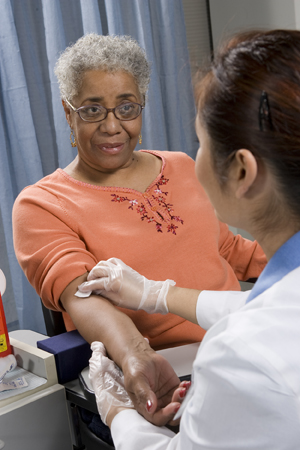Monitoring Kidney Health
Your healthcare provider will check the health of your kidneys. That way, treatment can be adjusted if your condition changes. If you have other health problems that affect your kidneys, such as diabetes or high blood pressure, they will be checked also.
Tracking your numbers
|
Blood pressure
-
Target is ___________
-
Mine is ____________
|
Creatinine level
-
Mine is ____________
-
Date ______________
-
Mine is ____________
-
Date ______________
-
Mine is ____________
-
Date ______________
|
BUN level
-
Mine is ____________
-
Date ______________
-
Mine is ____________
-
Date ______________
|
Keep appointments
Your healthcare provider may want to see you every few months. This is to see how well your kidneys are working. Your visits may include any of these tests:
-
Urine tests. Your urine is checked for protein or albumin, blood, and other signs of problems. A complete 24-hour collection may be used to measure how well your kidneys are working.
-
Blood tests. These tests measure wastes, such as blood urea nitrogen (BUN) and creatinine, left in the blood. You may have other blood tests to check for health problems caused by reduced kidney function. These include:
-
Low blood counts (anemia)
-
Parathyroid hormone (hyperparathyroidism, which leads to weak bones)
-
Low vitamin D levels (weak bones and other problems)
-
Low calcium and high blood phosphorus levels (weak bones)
-
High or low potassium (irregular heartbeat)
-
Imaging tests. These include ultrasound exams, and CT and MRI scans. These will show damage to the kidneys and blood vessels. Be sure to tell the X-ray specialist (radiologist) that you have kidney disease. Some X-ray tests use dyes that can harm your kidneys.

To maintain health
Be a partner in your care. Try the tips below to help maintain your health.
-
Stick to your diet. People with kidney disease may need to follow a special diet. You may need to avoid foods that are high in salt, potassium, and phosphorus. You may have to discuss your diet with a nutrition specialist (dietitian). Control other health problems, such as diabetes, high blood pressure, and anemia.
-
Talk to your healthcare provider. Tell your healthcare provider before taking any new medicines, either prescription or over-the-counter, or herbal remedies. Many medicines are eliminated from the body through the kidneys. This includes some topically applied ointments and creams. Your doses may need to be adjusted, depending on how your kidneys are working. Also, some medicines can hurt kidney function and need to be avoided.
-
Stop smoking. Smoking can increase kidney damage.
-
Maintain a healthy weight. Talk with your provider if you need help with managing your weight.
-
Exercise regularly. It helps you stay healthy and may help your kidneys work better.
Online Medical Reviewer:
Marianne Fraser MSN RN
Online Medical Reviewer:
Raymond Kent Turley BSN MSN RN
Online Medical Reviewer:
Walead Latif MD
Date Last Reviewed:
6/1/2022
© 2000-2025 The StayWell Company, LLC. All rights reserved. This information is not intended as a substitute for professional medical care. Always follow your healthcare professional's instructions.